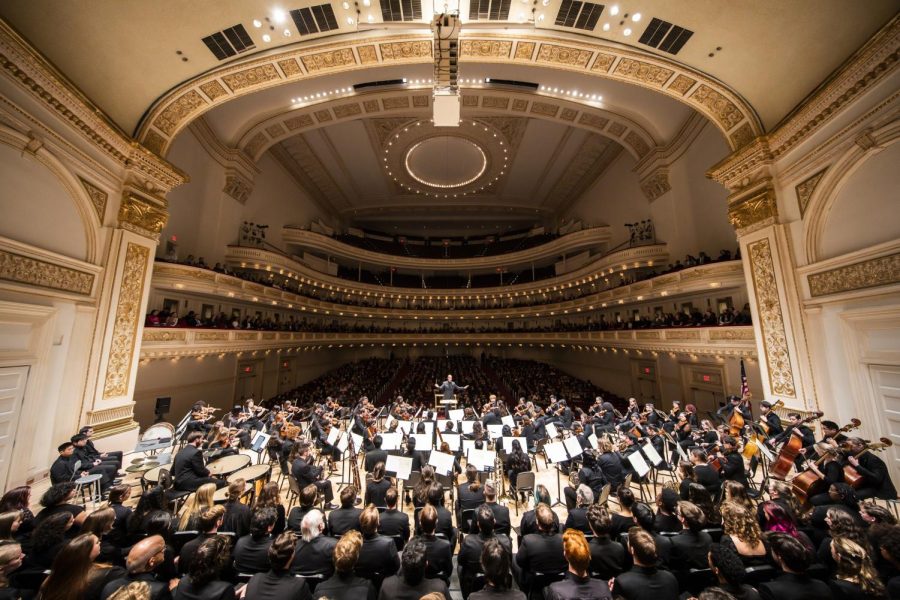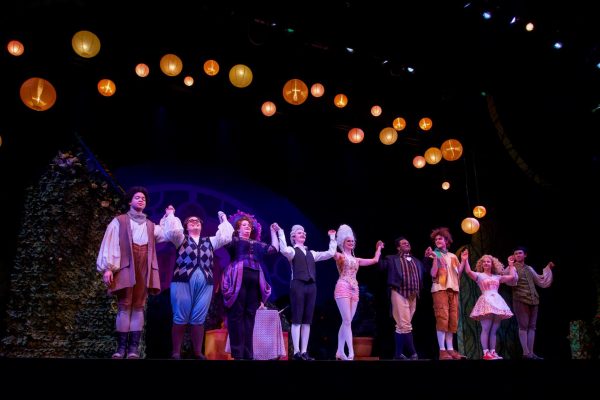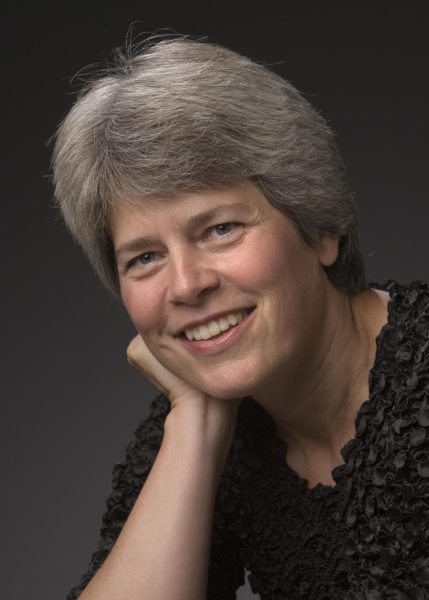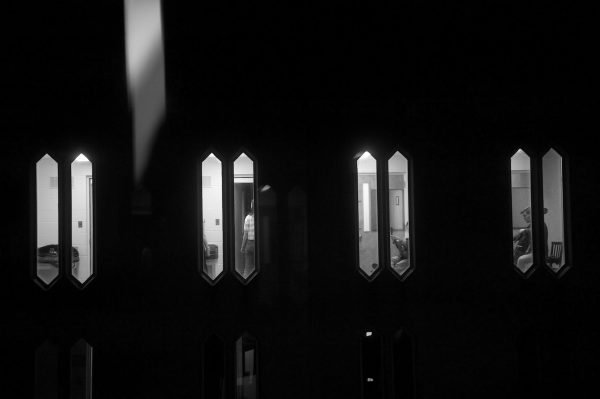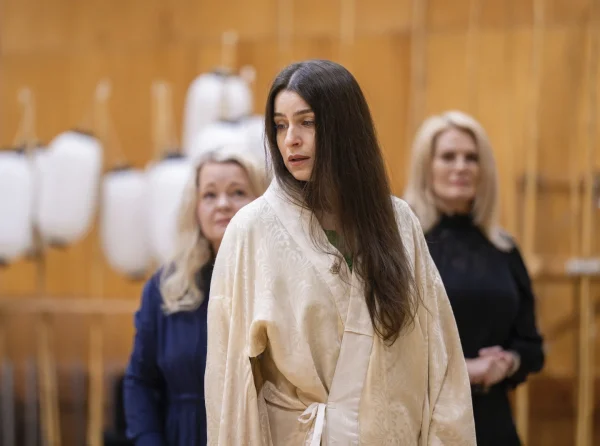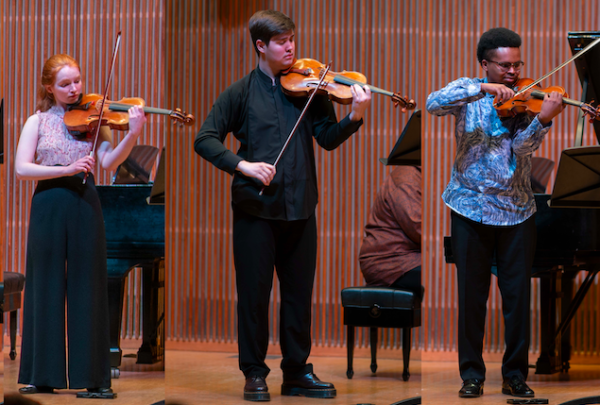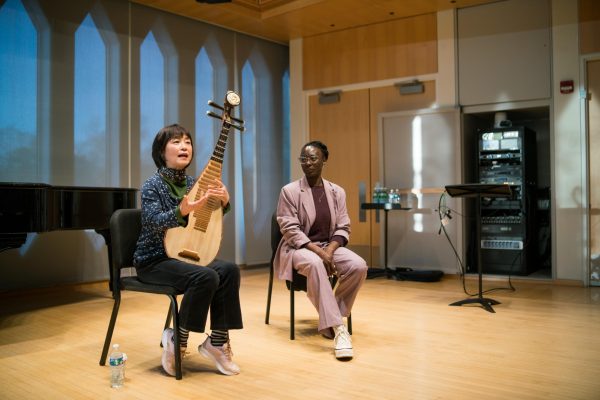Oberlin Performs at Carnegie Hall for U.N. General Assembly
Director Raphael Jiménez conducts the Oberlin Orchestra and Choir at Carnegie Hall.
Anticipating Greatness
After months of anticipation, Oberlin students took to the Ronald O. Perelman Stage at Carnegie Hall and performed live for an invitation-only audience of United Nations General Assembly delegates last Friday. The performance honored the work of President of the General Assembly Csaba Kőrösi, who has served in this capacity since September.
Five-and-a-half hours before doors closed, the orchestra sat on the same stage before a phantom audience, tuning their instruments and enjoying the moment with their peers. Between strums of their strings and breaths through their horns, the orchestra stopped to take in the magnificent concert room they were filling with their music: a room soon to be packed with approximately 1,800 audience members.
Backstage, staff from Oberlin and the Global Foundation for the Performing Arts prepared the venue with an electricity powered by pride for the musicians on stage. As if ready to march into battle, Director of Oberlin Orchestras Raphael Jiménez stepped out of his dressing room with a brilliant smile and resolute focus and began his walk to the final orchestral rehearsal before the concert later that evening. Walking beside Jiménez was Dean of the Conservatory William Quillen, who paused to talk about the ghosts of Carnegie — alleging a haunting by the friendly spirits of the greatest musical minds of history. Moments later, GFPA President Benjamin Woodroffe sat with the Review in Jiménez’s dressing room to discuss the resurrection of the U.N. Gala Concert tradition.
“In the early years of the United Nations, there used to be an annual concert,” President Woodroffe said. “When [GFPA] learned of that, we suggested this needs to be resurrected. We need an annual concert now because the world needs to be brought back together. … We looked at some of the past programs of these concerts, and one of them included the Rachmaninoff that we’re hearing tonight, and one of them, of course, included Beethoven’s Ninth Symphony. We thought, let’s put it back on the map. Let’s honor what has been, but let’s bring in today’s future musicians to perform it.”
As President Woodroffe spoke, a screen in the dressing room displayed a live stream of the performers rehearsing on stage. Looking at the Obies on the screen, President Woodroffe considered the partnership between Oberlin, the United Nations Institute for Training and Research, and GFPA and posed questions musicians need to consider when thinking about their futures.
“We have to create musicians — I’m looking at them on the stage behind you — and they have to be entrepreneurs as well,” President Woodroffe said. “They have to have a vision, and they have to think about what that vision is and how they will take it to the world. So performing different types of music, performing in different ways, performing in different spaces, in different venues, how they record their music, how they distribute their music. These are all questions that we would like to bring to the table with Oberlin as we go forward. But what really matters to me is that musicians play what they want to play, and they play the music that speaks to themselves now. If they play it, they’re dedicated to it.”
With four hours left before the performance, President Woodroffe prepared President Carmen Twillie Ambar, Chief of Staff David Hertz, Assistant to the President Jennifer Bradfield, and Administrative Manager Emily Speerbrecher for the proceedings of the evening. To the backdrop of fantastic orchestral swells, this small contingent toured the still-empty foyer of Carnegie Hall. Walking through the musical landmark, the group carried a refrain on the immense pride and honor they felt for Oberlin on the momentous occasion of performing for the U.N.
“This evening holds a significance that is palpable and powerful,” President Ambar said in her speech that evening. “What you will experience tonight cannot be fully measured in headlines or social media shares. We are not here to raise money or to dedicate a project. Rather, we gather — the United Nations General Assembly and Oberlin College and Conservatory — to commemorate our complementary missions to change the world for good through the power of music, beauty, and education.”
Catharsis Through Concert
Moments before the music began, the audience felt somewhat uncertain, not knowing what to expect nor the journey they were in for. The room settled, but somewhat scattered expectations remained, manifesting in light applause as the orchestra arranged itself onstage.
With instruments tuned and voices warmed-up, Jiménez waved the first notes of the night into life. “Fanfare on Amazing Grace” by Adolphus Hailstork inaugurated the evening, with a surprise appearance by Hailstork himself at the end of the piece. “If you’re looking for the composer, he’s out here — Hi folks!” Hailstork announced from the back of the hall to roaring applause. While the room cheered for Oberlin and Hailstork, presidents of the GFPA, the U.N. General Assembly, and Oberlin arrived on stage for their opening remarks.
“Article 1 of our charter says that the United Nations is to be a center for harmonizing the actions of nations,” President Kőrösi said in his address. “Much of what we are doing here — and most everything that we want to achieve — is about reaching harmony through listening to each other, acting together, and understanding the deeper context together. Just like a work of art, harmony among our nations means peace. Harmony all over the globe means solidarity. Harmony in our hearts means respect.”
As stage producers arranged the set for Sergei Rachmaninoff’s Piano Concerto No. 2, the excitement of holding a concert with a full orchestra was palpable. In December 2021, the U.N. Gala Concert exclusively featured a solo by pianist Byron Wei-Xin Zhou, who returned to noticeable excitement from the U.N. to perform the Rachmaninoff piece alongside the Oberlin orchestra.
Ahmed Abdelaziz, legal advisor to the Permanent Mission of Egypt, spoke to the Review during the intermission and was struck by the quality of the performance and selection of music for the evening. Oberlin Trustee Chuck Birenbaum, OC ’79, also spoke about the power of the concert and its relevance to the larger partnership with the U.N.
“It’s a fantastic partnership with the United Nations, and this concert shows how successful this partnership will be for Oberlin and for what Oberlin can do in the world,” Birenbaum said. “I’m really looking forward to what comes next. The emotion and the power that comes out of this concert is symbolizing, it’s iconic, of what kind of people we are at Oberlin or the United Nations.”
Even as they took the audience’s breath away, the musicians remained poised and graceful despite their long journey to the stage. Conservatory fourth-year and violinist Madeleine Zarry reflected on the unique challenges of performing in Carnegie Hall for the first time amid graduate school deadlines and impending final exams.
“Performing in Carnegie and rehearsing in Carnegie was extremely different than Finney Chapel,” Zarry said. “I think it took a lot of us by surprise, how different it was. Acoustically, it’s such an incredible hall, but that also comes with challenges that we have to overcome. Finney Chapel hides a lot of what happens on the stage, whereas everything that happens on the stage is projected in Carnegie. … I think we did the absolute best that we could have, and I do think that we did very well. … I think it was completely overwhelming for a lot of us, especially as a [fourth-year]. We left on Dec. 1, and all grad school applications are due on Dec. 1. It’s also right before finals, so a lot of us were very overwhelmed doing our applications on the bus ride there, exhausted. But all of that went out the window once we got on stage.”
The evening closed with the choral ensemble joining the orchestra for a fierce and uplifting rendition of Ludwig van Beethoven’s Symphony No. 9. Throughout the nearly two hours of music performed, Jiménez kept up his energy and zeal. For the audience, it felt as though the power of the room was emanating directly from him as he led the ensemble with both grace and authority. As the music unfolded, fantastic sound rushed forth from the stage, wrapping around the walls and flooding into the audience from all sides. Carnegie’s acoustics together with Jiménez’s conducting wove together an immersive symphony of sounds that embraced the room. With minutes to go until the finale, smiles of excitement shot across the faces of the performers: They knew the audience was in for the best part of the night.
“I have to say, too, that there was something about [Beethoven’s Symphony No. 9] which really speaks to a vision of universal collaboration, of universal harmony, of camaraderie and kinship,” Quillen said. “Those lines from the end, ‘this kiss is for the whole world, this kiss is for the whole world.’ Singing that piece and performing that piece at that moment for that audience was particularly meaningful and particularly poignant.”
The evening put the immense talent of Oberlin students in the spotlight for a visibly awestruck U.N. audience. A standing ovation celebrated the orchestra and choir for more than two minutes at the end of Beethoven’s Symphony No. 9, bookending a historic night for Oberlin and the United Nations.
Oberlin students will return to Carnegie Hall on Jan. 20, 2023 to perform for a general admission audience.


